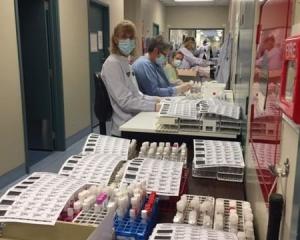
A man has suffered irreversible loss of vision after the Southern District Health Board's Ophthalmology Service failed to arrange a timely follow-up appointment for his care.
Health and Disability Commissioner Anthony Hill released a report today finding the DHB in breach of the Code of Health and Disability Services Consumers' Rights.
The findings came after an ophthalmology patient complained about an overdue appointment, which resulted in the partial loss of his eyesight.
The man, who had a family history of glaucoma, presented to the service in July 2014 after he was referred urgently by a community optometrist.
SDHB records for July 14, 2014, indicate the patient reported frequent headaches, had blurred distance vision, was finding it hard to read, and that he felt "very short sighted".
He was initially prescribed eye drops, before he was diagnosed with ocular hypertension in a later consultation in September 2014.
After this diagnosis, the consultant requested that the patient be seen again in six months' time.

That follow-up appointment was delayed by six months despite the man telephoning the Service and correspondence being sent by his GP.
The patient told the HDC that when he realised that he was overdue for follow-up, he telephoned the hospital several times.
During one of the calls, he reported the pain and blurry vision he was experiencing.
He told the HDC that at one stage he demanded an appointment.
"I demanded my appointment about three weeks before the 9th of September and I think it was roughly 3–4 months before that I rang to follow up on my appointment time," he said.
"The discussion I had was with the office lady, not a doctor, and yes I did demand an appointment.
"The reason for that was, I was having trouble seeing sometimes and I was having more and more headaches. So basically I rung them up and told them that I thought there was something wrong and I was having trouble seeing and having more and more headaches and if they didn't give me an appointment I was going to come to the hospital and not leave until I was seen.

"So as you can probably guess they gave me an appointment."
After the above contact, the patient was seen at an SDHB on September 9, 2015 - approximately six months overdue and double the requested time.
By this time, the man had suffered vision loss in his right eye and required an urgent referral to hospital for management and surgery.
Commissioner Hill found that the DHB had failed to arrange a timely follow-up appointment because of a number of factors, including; increasing demand for ophthalmology services in New Zealand, and the Service not having a prioritisation system that focused on patients' clinical need.
Hill said a key factor in increased demand was the introduction of very effective new therapies and treatment, which have resulted in consumers needing to see specialists for regular ongoing follow-up and/or treatment.
But he said the Ministry of Health has a role, with DHBs, to recognise the effect of the introduction of such new technologies and associated pressures on the system, and plan accordingly.

He also said that the DHB relied on administration staff, who lacked training and clear guidance, to prioritise appropriately.
"It did not recognise the clinical risk created by the lack of capacity at the Service, and did not take action to rectify the situation after an earlier serious event review in relation to a similar matter had raised associated concerns," he said.
"In addition, there were missed opportunities for the DHB to rectify the delay in the follow-up appointment."
Following on from the external review, and the ongoing work of DHBs and the Ministry of Health to address these issues, Hill made a series of detailed recommendations.
He recommended that the SDHB do an independent evaluation of the systems in place to identify and prioritise overdue ophthalmology patients, and an audit of the management of Ophthalmology Service referrals and follow-ups since December 2016.
He also recommended training and implementation of nursing staff and ancillary and non-specialist staff to remove inefficiency associated with lower priority tasks, as well as further recruitment of ophthalmologists, optometrists, orthoptists, and ophthalmology staff.
Lastly, he recommended the SDHB provide a formal written apology to the patient.
The DHB will also be referred to the Director of Proceedings for the purpose of deciding whether any proceedings should be taken.












